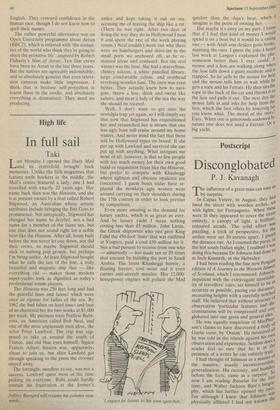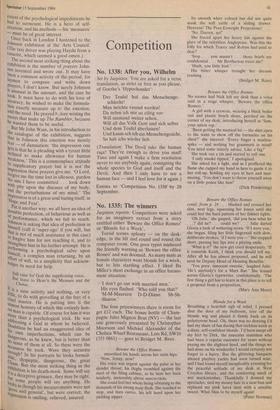Postscript
Disconglobated
P. J. Kavanagh
The influence of a great man can take .05 by surprise. In Capua Vetere, in August, they had lined the street with wooden arches, set with lights, for Ferraugosto. When these were lit they appeared to cover the street entirely, a canopy of light, a brilliant, coloured arcade. The solid effect Was puzzling, a trick of perspective, for the i arches were set 50 metres apart, I paced the distance out. As I counted the paces, is the hot south Italian night, I realised I was doing this because Dr Johnson had done s° at Inch Kenneth, in the Hebrides. I had been reading the fine new Penguill edition of A Journey to the Western Isla of Scotland, which I recommend. Johnson' Impatient with the extravagant unreliabil ity of travellers' tales, set himself to be as accurate as possible, pacing out distances; measuring heights with a carefully notchee! staff. He believed that without accuracy, observation 'particular features and dis- eliminations will be compressed and con: globated into one gross and general idea._ He was equally suspicious of MacPher son's claims to have discovered a body f Gaelic verse, by 'Ossian'. He measured all he was told in the islands against his own observation and experience. Seldom does a reader feel so sure that he is in the presence of a writer he can entirely trust. I had thought of Johnson as a master of the massive, usually incontrovertib!e, generalisation. His curiosity, and huntlicitY before the facts, came as a surprise. ?"t now I am reading Rasselas for the firs
.
time, and Walter Jackson Bate's bt°g1ra phy, which has further opened my eyes. For although I knew that Johnson was physically afflicted I had not known the
extent of the psychological impediments he had to surmount. He is a hero of self- creation, and his methods — his 'measures' must be of great interest.
Once back in London I hastened to the Johnson exhibition at the Arts Council. (The taxi driver was playing Haydn from a cassette, which seemed a good omen.) The second most striking thing about the exhibition is the number of prayers John- son invented and wrote out. It may have been a common activity of the period, for laymen to compose and write down prayers, I don't know. But surely Johnson is unusual in the amount, and the care he took. It must have to do with his love of accuracy, he wished to make the formula- tion exactly measure up to the emotion, and the need. He prayed b...fore writing the essays that make up The Rambler, because he wanted them to be useful. But Mr John Wain, in his introduction to the catalogue of the exhibition, suggests that in Johnson this emotion was mostly fear — of damnation: 'the impression one gets is that he is pleading with a tyrant little inclined to make allowance for human Weakness.' This is a commonplace attitude t0 supplicatory prayer but it is not the impression these prayers give,me. '0 Lord, forgive me the time lost in idleness, pardon the sins I have committed . . . look down with pity upon the diseases of my body, and the perturbations of my mind.' The Impression is of a great soul baring itself, in Hope and Fear'. Put it another way: we all have an idea of Possible perfection, of behaviour as well as (?1 performance, which we fail to reach. Johnson is asking that idea of perfection in himself (call it 'super-ego' if you will, but that is not of much assistance in this case) to forgive him for not reaching it, and to strengthen him in his further attempt. He is performing a psychological salve upon himself, a complex man returning, by an effort of will, to a simplicity that acknow- ledges its need for help.
Still raise foe. God the supplicating voice, But leave to Heav'n the Measure and the Choice.
It i
little a sane activity and nothing, or very 'Ittle, to do with grovelling at the feet of a utmost master. He is putting into it the utmost honesty of which this entirely hon- est man is capable. Of course for him it was more than a psychological trick. He was addressing a God in whom he believed. Doubtless he had an exaggerated idea of dangerous, own imperfections, which can be uangerous, as he knew, but is better than no sense of them at all. So these were the Measures he took. Were they accurate ,ekne, ugh? In his portraits he looks formid- e, dyspeptic, dangerous, the great sham. But the most striking thing in the exhibition is his death-mask. Some will say i,
h` is a deceptive grimace, they may be right, ;at some people will say anything. He
100ks as though his measurements were not _gross and general', but were correct; the expression is smiling, relieved, assured.



















































 Previous page
Previous page